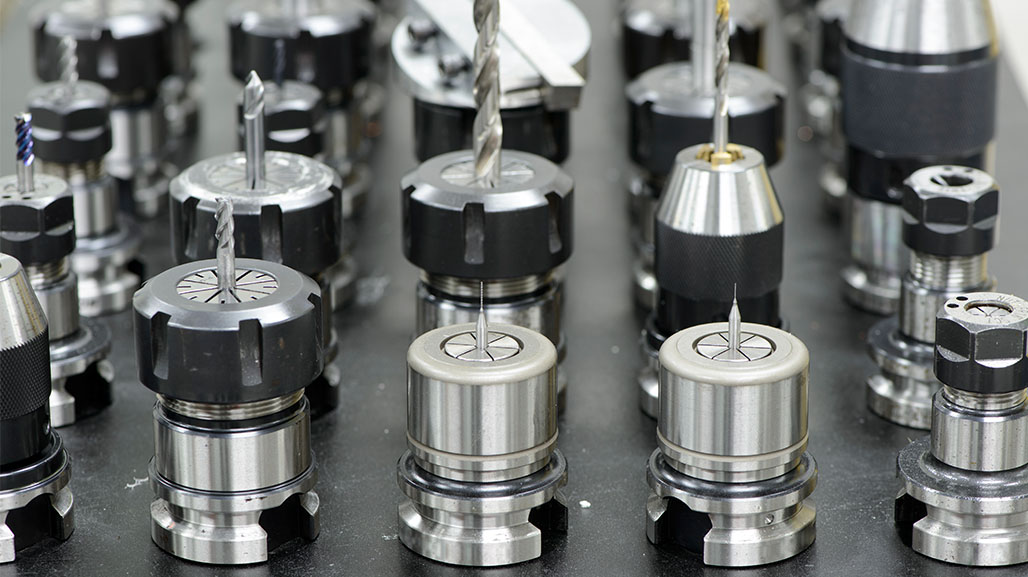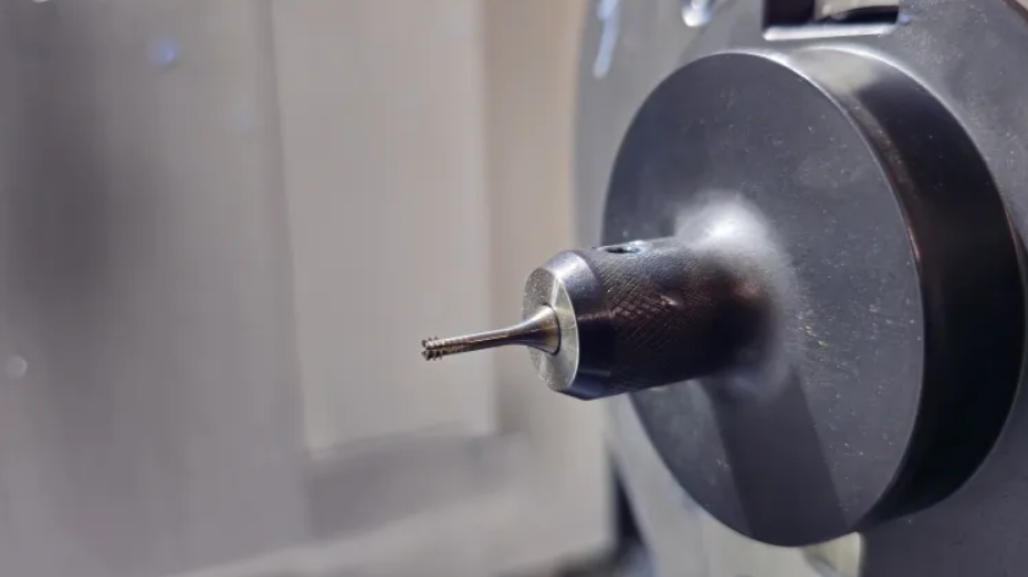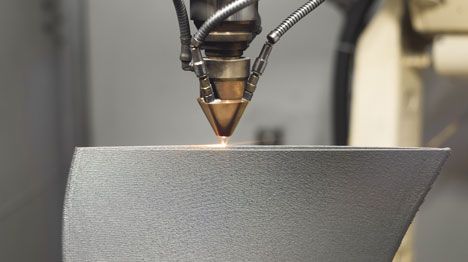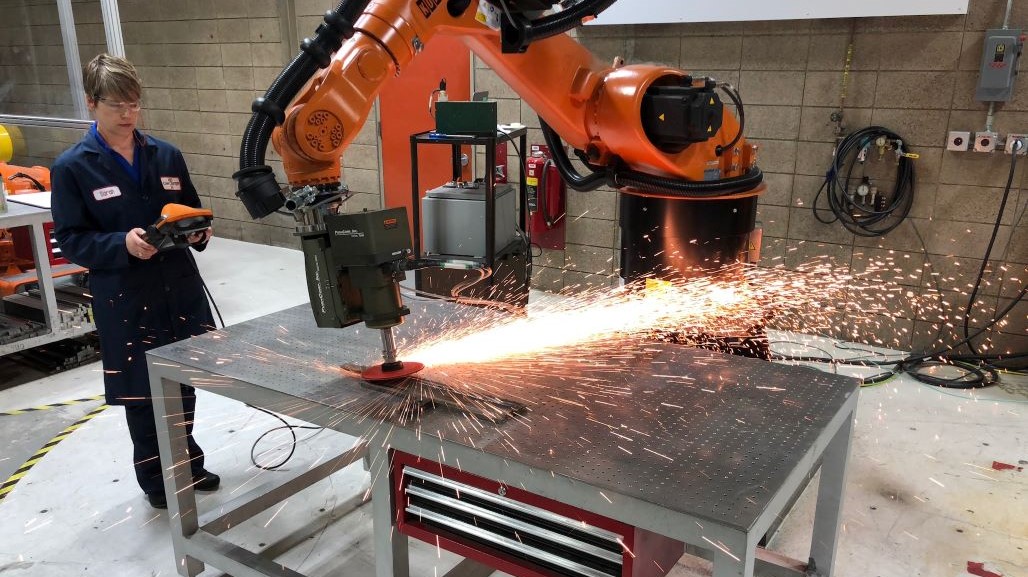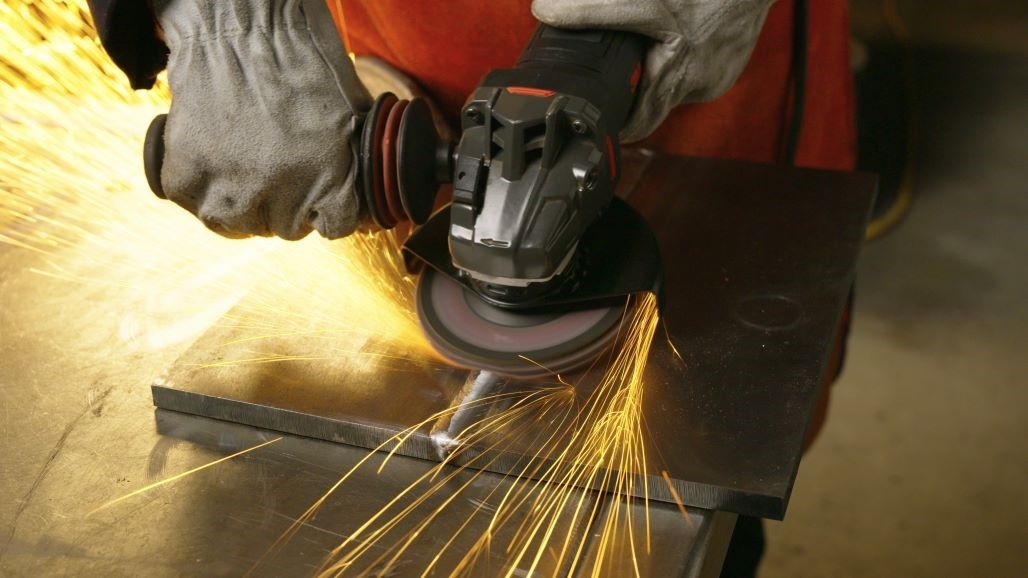How to Start a CNC Shop: Everything You Need to Know
The future is bright for precision shop Rocket Machining & Design. See how it got off the ground.
The future is bright for precision shop Rocket Machining & Design. See how it got off the ground.
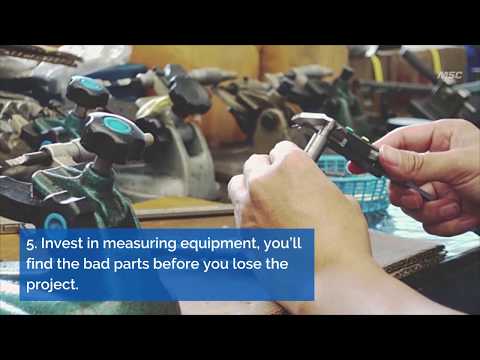
Looking to start your own CNC business? Learn all the details you’ll need to think about from a company that just did it. Rocket Machining & Design, a customer of MSC, may be a new kid on the block, but it has learned a lifetime of lessons and wisdom in its early incarnation—with plenty of precision automotive and medical device parts and prototype business to boot.
Duane Spurling Jr.
At 24 years old, Duane Spurling is not your typical job shop business owner—especially in manufacturing where the median age of the workforce is 44 years old, according to the U.S. Department of Labor.
Spurling owns Rocket Machining & Design, a small, seven-person precision shop based in Battle Creek, Michigan, that manufactures automotive and medical parts just outside of Kalamazoo.
Rocket Machining & Design, like its owner, is a young business. It began in late 2017 and prides itself on having opened for business in roughly 45 days—after the business loan was approved.
Everything about Spurling is surprising. He played three years of football for the University of Wisconsin. He initially studied biomedical engineering there, but he had an interest in business so he ended up in the entrepreneurship program, where he focused on product development.
“I love to make things,” he says.
At his core, Spurling is a builder. He spent his formative years in Slinger, Wisconsin, where he attended the No. 1 STEM high school in the state and was exposed to manual machining, programming and CNC machines.
But years before then, Spurling had a passion for racing motocross and would build custom parts with his dad—who is a sales and engineering manager for Tier 1 engine component supplier Bleistahl North America and used to run global production there.
Spurling’s other passion? Battle Bots and building robotic remote control cars.
For many years, Spurling and his dad spoke longingly of opening up their own custom manufacturing shop. And then an opportunity knocked on the door. A small shop wanted to sell—and Spurling convinced his dad they should go for it.
“I didn’t have much to lose, and I could run the shop,” says Spurling. “And my dad could help.”
Spurling worked at the place he originally intended to buy for a few months to get a feel for the business. He’s grateful for the support he has had around him—and the knowledge and experience his father and associates have brought to the table. But he has also had to do a lot of research on his own.
Making parts and knowing your machining is one thing. Understanding payroll and insurance and the nuance of the exact shop space size you’ll need is not something you pick up automatically from working the shop floor.
“During this period, Google is your friend,” says Spurling.
There was a lot of excitement. But two weeks before the closing on the shop they were intending to buy, the seller backed out.
“It was disappointing, but it ended up being a blessing,” he says.
Why? Because he got to build the shop from the ground up—and had to go through all those business unknowns on his own. It added a little more time to the process, but it helped him learn really fast that adaptation skills are essential.
There’s no one foolproof set of directions out there, so get ready for trial, error and having faith and confidence in your skills. And you do need the machining and programming skills to compete in today’s precision manufacturing. Knowing how to leverage machining technology and make efficient process engineering decisions is key.
Virtually no business can open up shop without capital investment—and that requires financial assistance in the form of a loan. A great source is the U.S. government’s Small Business Administration—which has some bureaucracy to deal with—but can be very helpful and supportive.
But you’ll need a business plan.
“The SBA wants to see the business story you are telling—and your plan to make it successful,” says Spurling.
And you’ll need a sense of your customer base. The Spurling family ended up moving to the Battle Creek area because of a promotion for Spurling’s father—which also ended up putting them in the heart of automotive part-making in central Michigan. There are also several large medical manufacturers in the area—including Stryker, a medical device maker, which is now a Rocket Machining & Design customer.
There are opportunities in medical parts-making. See it for yourself. Read “Precision Manufacturing: One Shop’s Journey in Making Medical Equipment Parts.”
Part of the business plan was understanding the machines and supplies needed to get up and running. Rocket Machining & Design initially purchased four machines: two lathes and two mills. But the plan and reality were always dependent on the work that came in.
The finished floor at RM&D before the equipment.
“In hindsight, if I could do it differently, I would have purchased three mills and one lathe,” says Spurling. “But we’ve purchased more machines since then. And we’ve sold one of those lathes and purchased another two mills. So we’re now up to a total of four mills and one lathe.”
One of the machines is a 3+2 CNC machine that can take advantage of many cutting geometries. The company has plans to purchase a full 5-axis machine in the near future.
How much has all this equipment cost?
“Roughly half a million dollars,” says Spurling. “It’s not just the mills and lathes, it’s also the saw to process materials, a surface grinder, tables, air compressors, furniture and fixtures, surface plates, gaging equipment, tooling, tool boxes, and many other items. You think about the big-ticket items, but that just scratches the surface.”
Spurling thought you apply for a loan, the lender reviews the business plan, you get approved—and the entirety of your loan amount ends up in your business bank account so you can start leasing CNC equipment, buying cutting tools and CAD/CAM software.
Nope. The SBA does not give it to you all at once.
“I could only have a certain percentage of the loan in cash in my bank account at any one time,” says Spurling. “Then I had to submit draws from the loan in order to purchase anything, like say, our large expenditure, like a HAAS VF5 for $75,000. I filled out the information to the banker, then the banker wired the money.”
Rocket Machining was allowed to have about 30 percent of the loan in cash—so if the company spent all the cash on necessary products then they’d have to submit an itemized list of purchases to the SBA to refill the cash. Sounds simple. But there was another catch: The company was only allowed one “draw” per month.
“I was like, ‘What’?!” Spurling says. “It was going to take us two years to build the shop at those rates, so we negotiated with them—and were able to get more funds released to open shop.”
When you are first starting out, it can be challenging to receive a line of credit for longer than a 30-day payment to replenish raw materials, says Spurling. So you need to manage your loan funds wisely.
As a newcomer, he would order $2,500 of raw metal material and machine all of that in 30 days—but not have payment for the work from customers yet. And the material supplier would not let Rocket Machining order more material without paying for that initial order.
Spurling was keen to point out that suppliers can also be a great resource for advising on what an early stage CNC shop needs out of the gate. It pays to go with a large product distributor that has excellent customer service, guaranteed shipping delivery times and competitive prices, he explains.
“It helps immensely,” says Spurling.
One of the other challenges was having the time to research the best prices for material. Another supplier allowed him to place a sizable order, which helped. As the business grew over time, Spurling was able to hire a person solely focused on purchasing and negotiating material pricing with existing suppliers. That hire only came in the last four months.
Need help with your machining calculations and measurements? Use our interactive metalworking machining and metalworking productivity calculators.
“One of the things you might not consider when starting out in this business, and it doesn’t pay you well for having it, is measuring equipment,” says Spurling. “The return on investment for measuring equipment is if you find bad pieces. Customers are only concerned with bad parts … We had to very quickly learn how to pay for items that lose you money. The cost of not purchasing metrology equipment is the cost of a project and the potential for losing it.”
More precision parts from RM&D.
You can have all the machines you need to make parts, but if you have no way to verify what you made is good, it is going to be hard to be in business, explains Spurling. This was eye-opening for him.
“This was something we did not necessarily take as seriously as we should have initially,” he says.
And it affected the volume of business won from one early customer.
“They had some parts with very large bore diameters and unfortunately, with bore gauges and grooving gauges, there’s not one size fits all that holds to the tolerances that we were looking to hold,” Spurling says. “We thought we had the right equipment, and by the time we got in the right equipment it was too late … It was a very good learning lesson.”
He’s since corrected.
Just because you have all the machines, tools and CAD/CAM systems in place does not automatically mean everything will go smoothly, explains Spurling.
“I ran Haas machines before—and CNCs, as did all the guys who work with us, and you think because you’ve done it, it will just work right out of the gate, but it doesn’t work that way,” says Spurling. “Whenever you think it’s going to go fast, cut that time into a third, because it’s going to take longer.”
There will be errors—and there will need to be the time to develop the internal processes to get everything communicated and working together.
“For the longest time, I was the hub of the shop, and things went only as well as I did at communicating information and getting it in front of people,” he says.
It sounds simple, but it’s not as easy as you think. Rocket Machining had to get the power company to come out and evaluate their site and add in new circuits and power so they could run everything.
You have to think about all of these things and not assume you will have it all from the start.
“We had to put in about $60,000 to $70,000 in electricity in our current facility,” says Spurling. “We had to put in a whole new electrical panel and wiring to run to the machines … and the wire itself is not cheap.”
The company is paying about $700 to $900 a month to power the shop floor and the office.
In its first incarnation, Spurling had the help of two of his father’s associates who are machinists. Spurling is not an owner who is sitting in an office. He’s on the floor every minute of the day making parts, fixing machine issues and developing the processes needed to hit his customer delivery targets.
He also has a few interns who have moved on to apprenticeships at Rocket Machining—and eventually will be offered full-time positions. Spurling is grateful for the team he has put together. He’s had to also find a few very experienced machinists with advanced skills, too.
Over the course of 13 months, Rocket Machining has grown from a few small customers to roughly 15 to 18—and has completed parts for around 25 companies, says Spurling.
How did they attract customers? By knocking on a lot of doors, by leveraging relationships with his initial partners in the business—and by being able to make the precision parts on the latest machining technology that some in the region are not able to do.
It doesn’t hurt that Spurling built the place in his vision: It is immaculately clean and bright and super well-organized.
“I want customers to see us as a premier shop, and to stand out,” he says. “I take a lot of pride in the way this shop looks.”
How did your shop start out? What lessons did you learn? Share in the forum. [registration required]
MSC has partnered with Tooling U-SME, a leader in manufacturing for nearly 90 years, to offer online training packages that support core manufacturing roles by helping develop and maintain the necessary skills to keep up with new innovations and advanced manufacturing.
If you’re thinking of opening up a new CNC shop, every bit of cost-savings can help. And in some cases, affordable subscriber-modeled options can not only trim your costs, but can give you extra flexibility. But there are some obstacles to overcome.
Take the case of Rocket Machining & Design that had been using Mastercam’s Solidworks for its CAD/CAM software but was looking to trim hefty annual costs of $50,000. Duane Spurling, the owner of the company, found a cloud-based system from Autodesk (Fusion 360) that allows him the ability to program a machine from anywhere with internet connectivity. He loves it, but it took some time for him and his team to learn the differences and resolve the bugs that caused some consternation.
“There was a learning curve—and we broke tools in the programming on simple plunging and spot drilling,” says Spurling. “The machinists were getting frustrated because these were processes we’ve all done a million times on simple tasks and it was taking forever.”
Spurling loves the flexibility it gives him being able to program from anywhere—and making changes or adjustments requested by his team on the fly from his computer is nice. He notes that some people complain that the software takes unnecessary extra movements, which can add time to a process.
“If it takes an extra two seconds, I am not going to lose any sleep over it,” says Spurling. “If I can save myself basically $40,000 a year with this software, it’s worth a little bit of time.”
